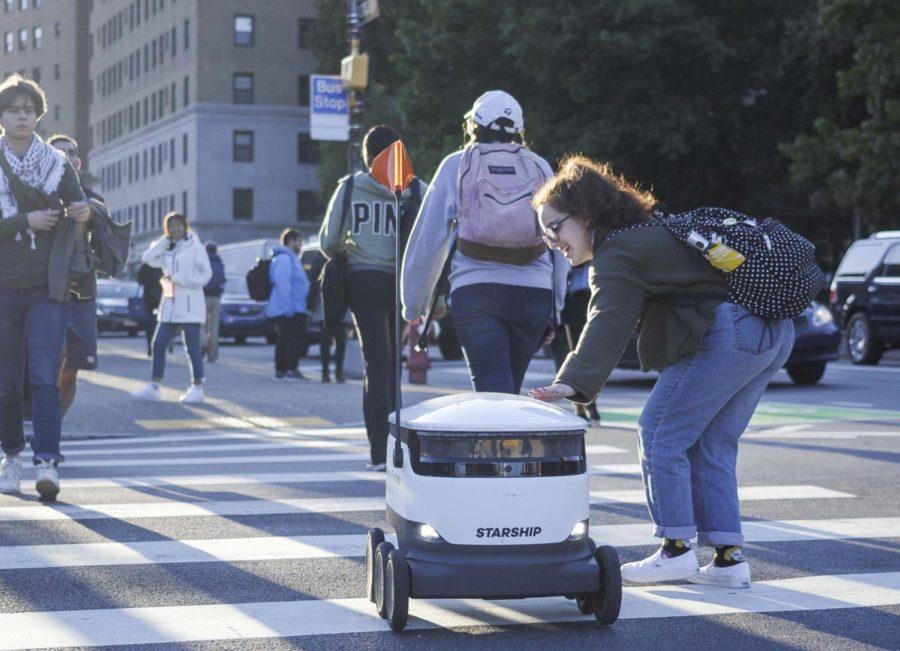Starship issues new statement after reviewing footage of viral incident on Forbes crosswalk
Thomas Yang | Assistant Visual Editor
Starship’s food delivery robots have been criticized for creating difficulties at crosswalks for wheelchair-using students.
October 22, 2019
Starship Technologies, which halted testing Monday at Pitt of its food delivery robots after a wheelchair-using student reported a safety concern, issued an updated statement Tuesday night after reviewing video of the reported incident.
Emily Ackerman, a fifth-year engineering doctoral student, posted a Twitter thread Monday afternoon describing a “major safety and accessibility issue” posed by the robots. Ackerman wrote that the robots rest in the curb ramp while they wait to cross the street, creating difficulties for wheelchair users like herself who need to use the curb ramp to reach the sidewalk. Ackerman made the thread because she had been “trapped” by one of the robots on Forbes Avenue earlier in the day, she said.
The thread quickly gained attention, and Pitt and Starship paused testing of the robots to “review the technology and ensure everyone’s safety,” as Pitt told Ackerman on Twitter. Starship sent The Pitt News a statement Tuesday morning apologizing to Ackerman and clarifying that the robots were not intended to wait in the curb ramp.
But after reviewing footage of the incident Ackerman described — each Starship robot is equipped with a camera — the company emailed The Pitt News a changed statement which did not include an apology. Starship spokesman Henry Harris-Burland said the video showed Ackerman traveling “past the robot without stopping.”
“We are always grateful when any potential issues are flagged to us that can help make us better,” Harris-Burland said in the statement. “We have reviewed the footage from the reported incident yesterday afternoon and are glad to see that Emily was able to travel past the robot without stopping.”
Harris-Burland said the company has updated the robots’ mapping to allow for additional room at the intersection of Forbes and Bigelow Boulevard, where the incident occurred, and that the company will review other intersections on Pitt’s campus to take similar precautions. He didn’t say when the robots would be back on the streets of Oakland.
Ackerman said Tuesday that when she saw the robot in her line of vision, she was able to move to the side and reach the sidewalk partially by using the sloped part of the curb. The thread she posted was meant to convey the difficulty the robot created by being in her path, she said.
In addition to describing herself as “trapped” by one of the robots on Forbes Avenue, Ackerman said in her thread that the robots could force wheelchair users to “remain in now moving traffic,” though she didn’t say explicitly that she had been forced to remain in moving traffic. Ackerman defended her use of the word “trapped” Tuesday, saying she was referring to the change she had had to make to her path.
“I don’t think that me moving past it and me being trapped can’t happen at the same time,” Ackerman said. “The point is that it was in the way … I don’t see where the specifics of this, like how long it took me to get past it, is relevant, because it shouldn’t have been where it was.”
Ackerman and Heather Tomko, another member of the Pitt community who uses a wheelchair, both said Monday that accessibility issues with the Starship robots don’t start and end with the crosswalk difficulties Ackerman described on Twitter. Tomko described her experience following a robot in her wheelchair on the sidewalk in front of Towers Monday, unable to pass by.
Tomko also said she wouldn’t be able to use the robots herself because of her height, although she would appreciate the convenience of having food delivered.
“Once again, there are new technologies … that aren’t planning for people with wheelchairs, whether it’s in the use or in the implementation,” Tomko said.
Starship said in both versions of its statement that the company tested the robots in communities with the help of disability rights organizations including Guide Dogs, Disability Rights UK and the Royal National Institute for the Blind, but that it can “always do more.”
Harris-Burland said the company wants to make its technology accessible for everyone.
“Autonomous delivery has the promise to be a welcomed help to many people with disabilities by assisting in the ease of getting groceries, food and packages delivered directly to their doorsteps,” Harris-Burland said.








